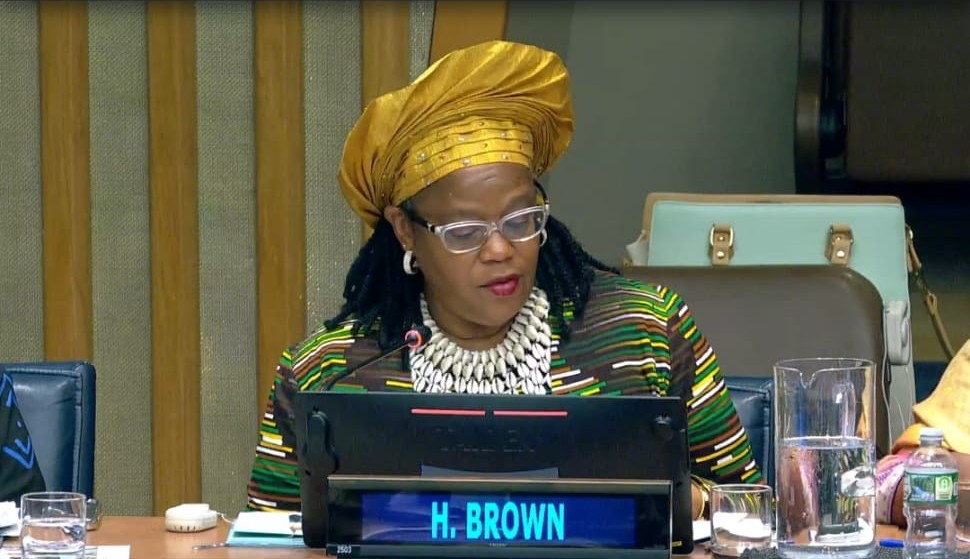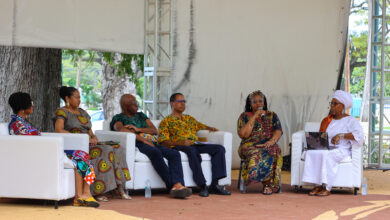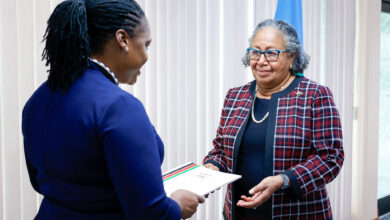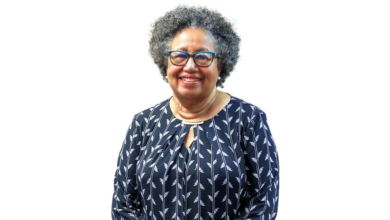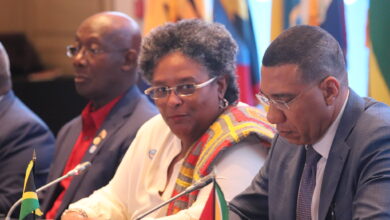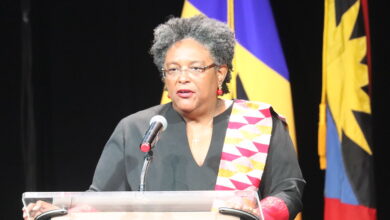“Through strengthened collaboration between CARICOM and the African Union there is the opportunity to articulate a clear diplomatic, and advocacy strategy to advance the [Reparations] agenda through joint action in the United Nations, the Commonwealth and other intergovernmental bodies…”
Dr Hilary Brown, Programme Manager, Culture and Community Development, CARICOM Secretariat
Dr Hilary Brown, Programme Manager, Culture and Community Development, delivered remarks on 15 April at the UN Permanent Forum on People of African Descent (Fourth Session).
She underscored that CARICOM sees the partnership with Africa and the African Union (AU) as an important alliance towards successfully realising the reparations claim.
Dr Brown highlighted that through the strengthened collaboration between CARICOM and the AU there is the opportunity to articulate a clear diplomatic, and advocacy strategy to advance the agenda through joint action in the United Nations, the Commonwealth and other intergovernmental bodies; to co-sponsor a joint resolution on reparatory justice in the UN; and to advocate for a High-Level Political Forum on Reparations, as recommended by CARICOM Heads of Government.
She stated that partnerships with the Permanent Forum and Working Group of Experts on People of African Descent are especially important in this context, as well as working through CARICOM and AU missions in New York and London.
Please read Dr Brown’s remarks below.
First, let me express my sincere appreciation to the Permanent Forum on People of African Descent for inviting me to participate in this Fourth Session and to make a contribution to this esteemed panel.
CARICOM through its Reparations Commission led by Professor Sir Hilary Beckles with oversight by the Prime Ministerial Subcommittee on Reparations chaired by Prime Minister Mia Mottley, has been in the vanguard, advocating for reparations for centuries of genocide of the indigenous people of the region, the horrors of the trafficking of enslaved Africans through the Middle Passage and chattel enslavement in the Caribbean and Americas.
These systems were carefully designed and orchestrated to enrich the enslaver colonizer and for over 300 years, Africa was under siege, her political, economic and social systems thrown into chaotic instability as Europe plundered the continent for her most valuable asset – her people. The scale and magnitude of these crimes against humanity are recognized in the Durban Declaration and Programme of Action of 2001, but were highlighted long before then by great Pan-Africanists, Garveyites, Rastafari, many great reggae artists and by Sir Arthur Lewis, Saint Lucian Nobel Laureate for Economics who wrote in 1939 about the yet unpaid debt by Britain for over 200 years of free labour from enslaved Africans in the Caribbean.
The renaissance of the global movement for reparatory justice and the momentum that has been built with the Ten Point Plan for Reparatory Justice as the guiding conceptual framework is indeed an achievement in which we all share and to which we have all contributed. However, in recent years we have seen the resurgence of the reparations movement in Africa, spreading the message through the AIDO network of traditional African kingdoms; as well as several government and academic conferences around reparations, healing and the return of cultural property; the convening of the Accra Reparations Conference in November 2023 in Ghana and the momentous designation by the African Union of the theme for 2025 as “Justice for Africans and People of African Descent Through Reparations.” And I say resurgence of the movement in Africa, acknowledging the convening of the First International Conference on Reparations in Lagos, Nigeria in 1990. Pioneered by Chief Moshood Abiola of Nigeria and Ambassador Dudley Thompson of Jamaica, a historic Summit was held that culminated with the issuing of the Abuja Declaration, calling for the payment of reparations to Africa and her diaspora ‘for damages done because of enslavement, colonization, and neo-colonialism’.
CARICOM sees the partnership with Africa and the African Union as an important alliance towards successfully realising the reparations claim. With the strengthened partnership with the AU, the global reparations movement is at a defining moment, an inflection point marked by a united global Africa finally coming together to speak with one voice on seeking justice for Africans and people of African descent. The calls for reparatory justice can no longer be ignored.
Through strengthened collaboration between CARICOM and the African Union there is the opportunity to articulate a clear diplomatic, and advocacy strategy to advance the agenda through joint action in the United Nations, the Commonwealth and other intergovernmental bodies; to co-sponsor a joint resolution on reparatory justice in the UN; and to advocate for a High Level Political Forum on Reparations, as recommended by CARICOM Heads of Government. Partnerships with the Permanent Forum and Working Group of Experts on People of African Descent are especially important in this context as well as working through CARICOM and AU missions in New York and London.
CARICOM and the AU especially in the context of the Second International Decade for People of African Descent, also have the opportunity to build out a popular, inclusive movement on the continent and in the diaspora based on a Pan-African ethos, bringing civil society, artists and especially youth together in a global reparations stakeholder forum. Civil society has kept reparations alive in our consciousness and must be at the centre of the movement. Establishing a joint committee of experts to support coordinated action would also be useful.
In closing I would say that the current mood in CARICOM is “enough talk, time for concrete results.” After 12 years of advocacy it is past time to negotiate with all the entities that benefited from African enslavement – governments, universities, the church, the private sector. And some of that has already started with Greene King (St. Kitts and Montserrat), with the Bank of England, the Church of England, the families that have apologized and Universities like Glasgow, Cambridge and Harvard. And further that it is essential that CARICOM Governments, determine the acceptable levels of restitution, compensation and satisfaction for the Region – not the European entities making reparations. There must be adequate consultation to determine the reparations package which is not only about monetary compensation. However, negotiated financial payments must be transferred to the Region, not retained in Europe and requiring grant proposals and applications to access the funds. These approaches do not constitute reparations or justice.
CARICOM is ready to take this agenda to the next level and we welcome the partnership of the African Union and other coalitions that share the vision and conviction necessary to ensure that Europe is held to account. Thank you.

